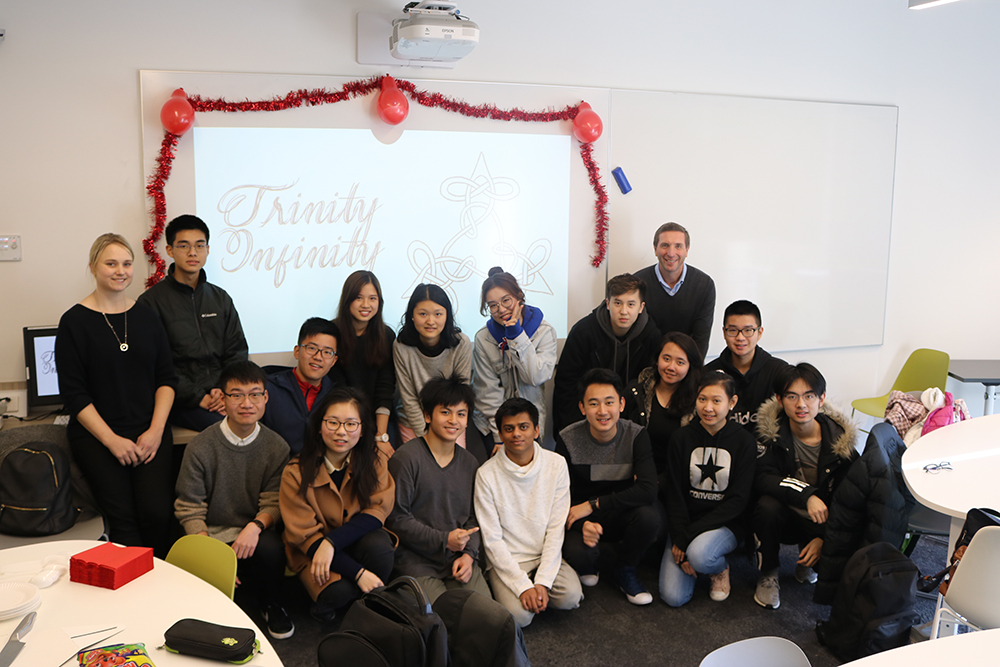Trinity College’s zero robotics team wins national round upon first participation
On April 2018, a team of Trinity College Foundation Studies students, the majority of whom are brand new to computer science, gathered to compete in Zero Robotics Tournament, a robotics programming competition for high school students worldwide. Two months later, the team won decisively in the domestic round and is ready to head into the international round taking place this September.
What is Zero Robotics (ZR)?
ZR is a robotics programming competition where teams program robots, also called SPHERES, to solve a given challenge. The programmed units aim to complete game objectives like picking up blocks to score points while conserving resources like fuel and charge. Finalists that make it through to the international round are to compete in a live championship aboard the International Space Station, conducted by an astronaut in microgravity.
The competition is held annually by the University of Sydney and is designed to encourage students to take up coding at no cost. To develop a successful game strategy, students are required to learn the physics and mathematics behind the motion of the SPHERES robots.
Trinity’s hard-earned victory
“I was amazed that we ended up winning the domestic competition,” said Sasha Cyganowski, who is the supervisor of Trinity College’s Zero Robotics team.
“When I saw this competition, I thought it’s a great way for students to apply the skills and what they are learning in Math 2 into a programming competition of an international background.”
This year was Trinity College’s first time entering the competition. Yet, not only were the students new to Zero Robotics, the majority of them were novel to computer programming itself.
“I thought even if we don’t make it through to the international competition, then it’s still a good experience for the students to do some coding and, most importantly, to know how to work as a team.”
Akash, one of the two group leaders shared his experiences with his team of programming beginners and novices.
“We were not required to be expert programmers to join the team. In fact, apart from 4 or 5 of us who are the ‘professionals’ at programming, the rest of the team are all learners. Some of us entered the competition not knowing how to write a single line of code.”
The team also found itself hard-pressed for time, and communication problems invariably arose along the way.
“At first, we were supposed to have six to eight weeks to finish our first task, but we did not have the luxury of that time because of our exams. So, we decided to stop one week before the testing period, made the six-week plan into 3 weeks and just crammed the whole thing in,” said Akash.
Because they were pressed for time, the students had to hit the ground running despite being strangers to each other.
“Many group members have not been in a big team before and many of them are not comfortable with working in a group that uses English as the primary language.”
Both student leaders Duong and Akash had a challenging time making sure communication gaps were mended and help the team stay on the same page.
“Because the group is like a set of building blocks. If one block falls, the whole structure collapses,” Akash explains.
In the end, all the efforts to overcome these challenges proved to be worthwhile as the team won rounds after rounds in the competition.
“After putting together all the codes, seeing them in simulation is a truly wonderful moment. Seeing our mistakes, noting down other teams’ tactics, realizing how we can fix our bugs here and vector problems there; all that makes the competition very exciting,” Akash shares.
The next stop for Trinity’s SPHERES
The team is heading into the international round of the competition this September, where they will work together with two other groups from other countries to solve the new coding problems assigned.
The location for the international round has yet to be released but the Trinity Spheres are keen to reach the end of the competition.
“With the way it has gone, I feel we could stand a budding chance at the international round,” the team leaders voiced with confidence.
For more information on the competition, visit the University of Sydney’s page.
This story was produced by Media and Communication students at Trinity College Foundation Studies as part of Meld’s community newsroom collaboration. Education institutions, student clubs/societies and community groups interested in being involved can get in touch with us via meld@meldmagazine.com.au.
